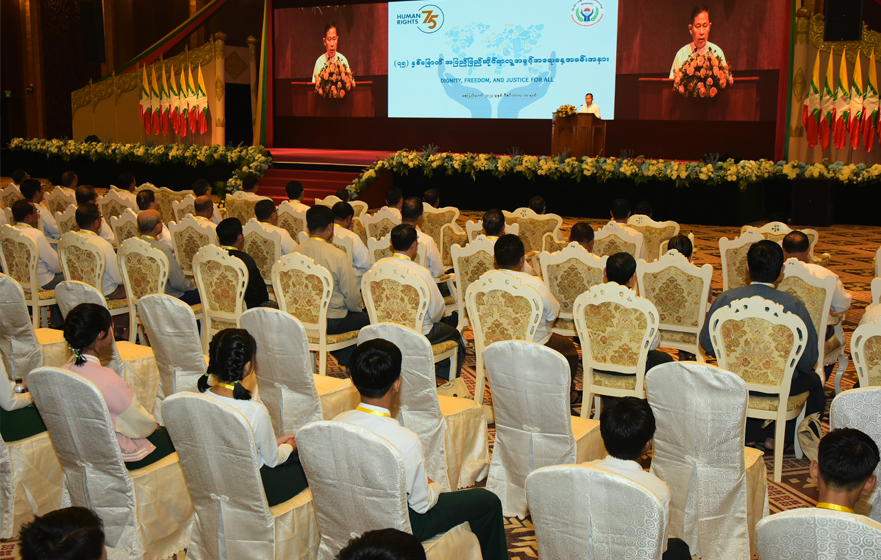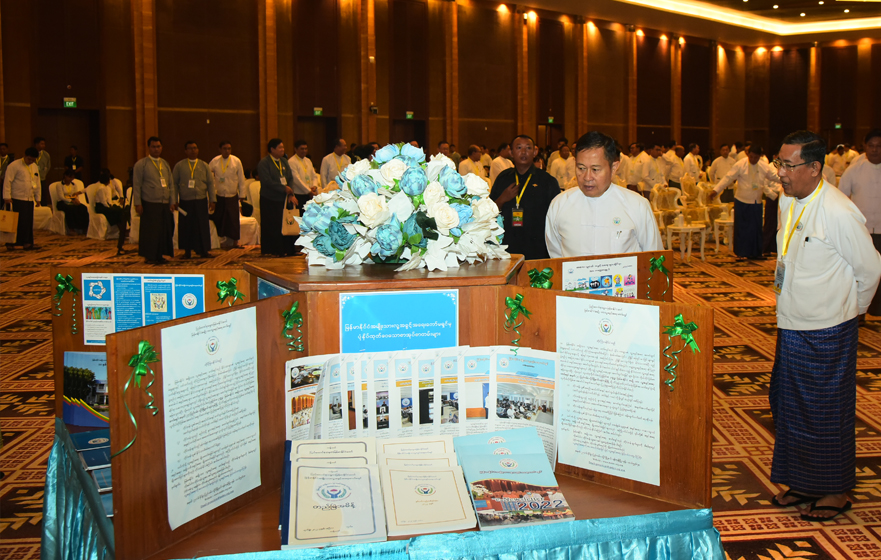Vice Chairman of State Administration Council Deputy Prime Minister Vice-Senior General Soe Win delivers address at ceremony to mark 75th Human Rights Day
Nay Pyi Taw December 10
A ceremony to mark the 75th Human Rights Day was held at the Myanmar International Convention Centre-1 in Nay Pyi Taw this morning and Vice Chairman of the State Administration Council Deputy Prime Minister Vice-Senior General Soe Win delivered an address at the ceremony.
Also present at the ceremony were members of the SAC, union-level officials and union ministers, the chairman of the Nay Pyi Taw Council, senior military officers, the commander of the Nay Pyi Taw Command, deputy ministers, officials from the Myanmar Human Rights Commission, UN agencies and foreign missions in Myanmar and guests.
First, the Vice-Senior General delivered an address, saying after regaining independence, Myanmar became a member of the United Nations on 19 April,
1948. Myanmar voted for the declaration of universal human rights at the general assembly held on 10 December, 1948. In accordance with the decision, 10 December, on which the Universal Declaration of Human Rights was adopted, was designated as the Human Rights Day.
Ceremonies to mark the 75th Anniversary Human Rights Day to commemorate the adoption of the Universal Declaration of Human Rights are held in countries across the world.
As Myanmar respects human rights, the country participates in UN activities consistently in accordance with provisions of the UN and holds the ceremony in the same way as other countries.
The UN adopted the Universal Declaration of Human Rights, which set human right standards for mankind based on human dignity, freedom and justice, on 10 December, 1948. The declaration includes 30 paragraphs, covering fundamental human rights, civil and political rights, economic, social and cultural rights and responsibilities of mankind.
As the declaration recognizes dignity and equality of all humans, it has been translated into more than 500 languages to enable all humans to understand it comprehensively and was recognized as the most translated declaration in the world by the Guinness World Record.
As countries across the world were aware that it is necessary to form human rights bodies to enable their citizens to enjoy human rights, they made efforts to form such bodies. An international workshop on the formation of human rights bodies was held in Paris, France in 1991. During the workshop, fundamental principles to be observed in formation of national human rights bodies and operations were adopted. It was learnt that 120 national human rights bodies have been formed in the world.
In Myanmar, to protect the fundamental rights of citizens under the 2008 constitution and to enable citizens to enjoy rights under the Universal Declaration of Human Rights, the Myanmar National Human Rights Commission has been formed for 12 years. Measures are being taken by the Myanmar National Human Rights Commission and relevant organizations are exerting efforts to create peaceful communities and eliminate discrimination in various sectors by respecting human rights.
Myanmar signed international human rights conventions including the International Covenant on Economic, Social and Cultural Rights, The United Nations Convention on the Rights of the Child, The Convention on the Elimination of All Forms of Discrimination Against Women and United Nations Convention on the Rights of Persons with Disabilities and associated documents and observing the provisions of the conventions.
Nowadays, it is known to all that fundamental rights of humans have been undermined by wars, instabilities, rivalries and interference between countries and natural disasters and consequences caused by climate change.
Peace, development and human rights are interrelated and humans can lead peaceful lives and enjoy high socioeconomic lives and human rights only when peace and development are guaranteed. Stability of the entire country is essential for enabling citizens to enjoy fundamental human rights and high social lives.
As our council is well aware of this fact, we are working hard to reduce the violence and instability in the country and achieve peace. In view of a peaceful and prosperous future for the nation and the ethnic people and a better present, we are striving to strengthen the multi-party democratic system full of flourishing discipline and build a union based on democracy and federalism as a political goal. Promoting and protecting human rights helps build and maintain peace, and peace is essential for the citizens to fully enjoy human rights.
No matter how much efforts are made to encourage people to respect human rights and obtain basic human rights, if peace and stability does not prevail and if there are riots, violence and armed conflicts, human rights in those areas will also be weak. Only if the entire people participate in the State’s efforts to ensure the equality of ethnic people's rights and national unity, will human rights flourish in a peaceful society.
Therefore, only when the armed conflict ends and true peace is achieved, can the benefits for all citizens be furthered. So, it is necessary for all stakeholders to make an all-round effort to ensure stability and peace in the country.
As our government prioritizes to develop the socio-economic life of the people, we are also encouraging domestic and foreign investments, creating employment opportunities and improving the economic sectors. Working on these means promoting people's human rights and protecting them against harm and loss.
This year's International Human Rights Day theme is "Dignity, Freedom and Justice for all." "All human beings are born free and have equal human dignity and rights," as stated in the Universal Declaration of Human Rights, which states that human rights are the inalienable rights of all human beings. However, the essence and meaning of human rights will be apparent only if we respect and value the rights of others while enjoying our own rights and do not harm them.
The ethnic people who live in the Republic of the Union of Myanmar, which is founded with diversity, should respect each other, hold human dignity, and practice their rights and responsibilities.
After that, Chairman of the Myanmar National Human Rights Commission U Paw Lwin Sein explained the activities of the commission, and Vice Chairperson Dr Nada Hmoon read the message sent by the Secretary General of the United Nations to commemorate the International Human Rights Day.
Then, a documentary video of the 75th Anniversary of the Universal Declaration of Human Rights, referred to by the United Nations as a commemoration of the International Human Rights Day, and a documentary video of the introduction of the Universal Declaration of Human Rights books translated into eight Naga ethnic languages and Kachin (Lawwaw) ethnic languages as a cooperation program with the Ministry of Ethnic Affairs in 2023 were shown.
Afterwards, the chairman of the National Human Rights Commission presented an honorary gift to the Vice-Senior General.
Artistes from the Fine Arts Department under the Ministry of Religious Affairs and Culture performed with a commemorative song.
Later, the Vice-Senior General and those attending the ceremony viewed the photos of the Myanmar National Human Rights Commission's activities and publications on human rights.



